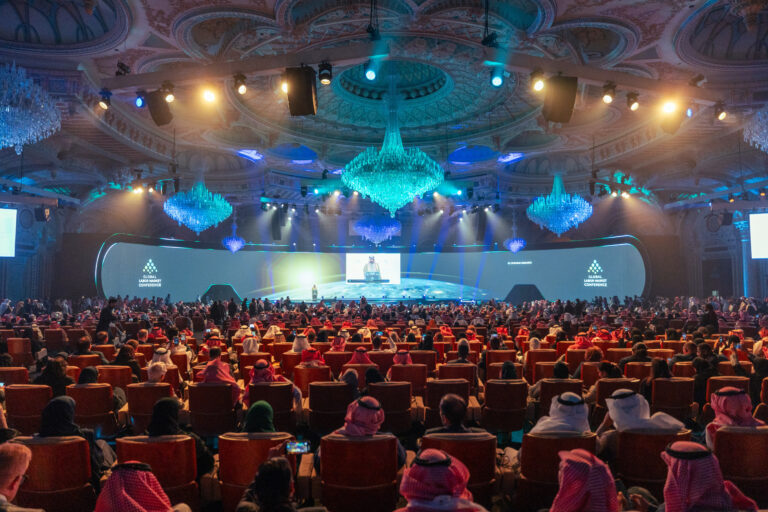The second edition of the Global Labor Market Conference (GLMC) 2025 successfully wrapped up at the King Abdulaziz International Conference Center in Riyadh, leaving an indelible mark on the global workforce landscape. Over two days, the event brought together over 10,000 participants, including 40 labour ministers and more than 200 global experts and speakers from over 100 countries. The conference further reinforced GLMC’s reputation as a leading platform driving the future of work worldwide.
Inaugural Address and the Global Labor Charter
The event commenced with an inspiring keynote speech by H.E. Eng. Ahmed bin Sulaiman Al-Rajhi, Saudi Arabia’s Minister of Human Resources and Social Development. During his address, he unveiled the Global Labor Charter, a pioneering initiative aimed at revolutionising the future workforce. The charter is built upon eight key pillars, focusing on youth workforce integration, readiness for digital transformation, human capital investment, and fostering stronger collaborations between governments and industries to create innovative, employment-driven solutions.
Launch of the Labor Market Academy
A significant highlight of the conference was the announcement of the Labor Market Academy, a strategic collaboration between GLMC, the World Bank, and Takamol Holding. This academy aims to equip future labour market leaders with cutting-edge policymaking skills. The inaugural cohort will include 30 participants, with plans for expansion to 600 participants within three years, thereby fostering global knowledge exchange and policy innovation for dynamic labour markets.
Introducing GLMC Policy Labs
The conference also introduced two policy labs, created in partnership with the World Bank, focusing on practical solutions to labour market challenges. The Active Labor Market Programs (ALMPs) Lab aimed at integrating youth into the workforce through innovative employment initiatives, while the Sectoral Skills Councils (SSCs) Lab sought to enhance private sector engagement in skills development and workforce planning.
Strategic Agreements to Enhance Global Workforce
As one of the most influential platforms for global labour market transformation, GLMC facilitated the signing of 70 memorandums of understanding (MOUs) and strategic agreements. These agreements, which will directly impact over 300,000 individuals, address workforce skills enhancement, employment opportunities, and the advancement of labour policies. Key partnerships were formed between government entities and private sector leaders such as the Ministry of Tourism, Takamol Holding, INSEAD, UiPath, and others.
Research Insights on Youth Employment
As part of its research-driven agenda, GLMC unveiled an in-depth global report, “Making Labor Markets Work for the Youth,” created in partnership with the World Bank. The report examines the challenges faced by economically inactive youth aged 15-24 and offers a strategic framework for addressing these issues, presenting case studies and actionable solutions.
Global Discussions and Future Outlook
The conference featured 40-panel discussions with 200 global speakers, addressing topics such as the impact of artificial intelligence and emerging technologies on employment, demographic shifts, bridging the skills gap, and promoting green jobs. Distinguished figures from governments, international organisations, and academia explored sustainable solutions for the evolving labour market.
A Continuing Commitment to Global Workforce Development
Recognised as a powerful global platform for labour development, GLMC continues to solidify its role as a year-round knowledge hub. By bringing together governments, industry leaders, and global institutions, GLMC remains at the forefront of driving innovative policies to adapt to the ever-changing world of work. With its focus on global collaboration, the conference sets the stage for a resilient, inclusive workforce while aligning with Saudi Vision 2030.
The success of GLMC 2025 underscores Saudi Arabia’s dedication to shaping the future of work, advancing human capital development, and fostering international labour market progress. By focusing on strategic partnerships and policy innovation, GLMC is set to continue influencing the workforce of tomorrow.
